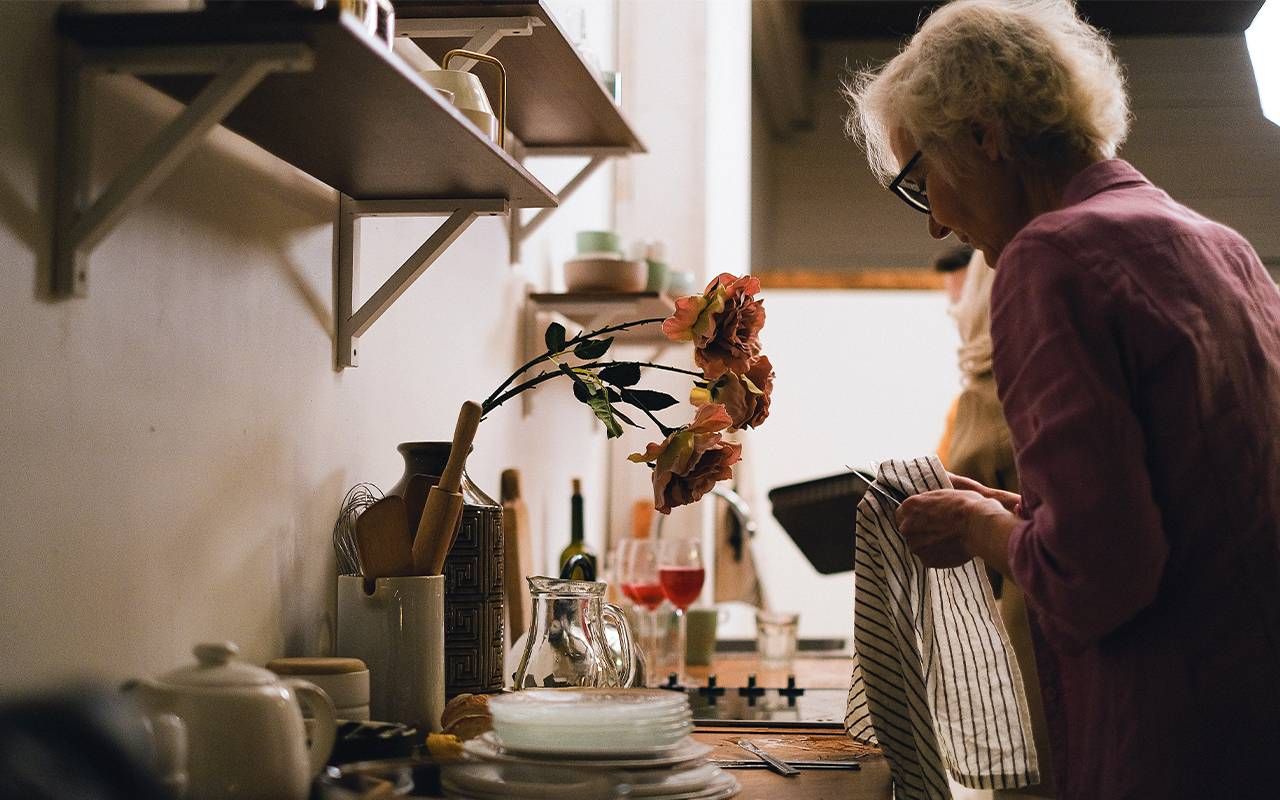How Conquering My Cleaning Habit Improved My Mental Health
Overcoming the impulse to clean my way out of uncomfortable feelings has taken conscious effort, but the results are worth it
I have a vivid memory from childhood of my mom washing dishes in her coat at the kitchen sink. She'd often come in the door, push up her sleeves and get straight to work. Sometimes she'd bounce from foot to foot, a signal that she needed to use the bathroom.
Why was she so consumed by the mess that she couldn't take the break she needed? And it wasn't just dishes. She scrubbed the tub, vacuumed, mopped and dusted.

If my dad was moody, or when life wasn't going her way, she cleaned as an escape and a way to control the things that were sometimes out of her control. So as I watched her put everything else – even a sink full of dishes – ahead of her needs, I internalized the exact coping mechanism.
In the early days of the pandemic, I often found myself mindlessly cleaning. Disguised as a way to keep germs at bay, cleaning became a way to do something in the face of a situation I couldn't control. The world felt like it was falling apart, but my house would be clean, damn it.
Overcoming this impulse has taken a conscious effort, but the rewards are worth it.
More Cleaning, More Anxiety
The only problem is that it didn't work. Even as I tried to wash and tidy my way out of uncertainty, my anxiety swelled. The busy work made me feel useful but separated me from my family and from processing my emotions.
My inclination to clean my way out of uncomfortable feelings pre-dates the pandemic. When I'm feeling blue, overwhelmed or angry, my first impulse is to start decluttering; before I know it, I'm a full-blown cleaning tornado.
Yes, some of my best thinking happens when I wash dishes and watch the birds gather in the large rhododendron outside my kitchen window. Still, I've also realized that the impulse to clean can signal that something more important than a cluttered house is bothering me.
When I'm feeling scattered and overwhelmed with work deadlines, managing a household and parenting a teen, deep cleaning is an escape that comes at the expense of dealing with inner turmoil.
Overcoming this impulse has taken a conscious effort, but the rewards are worth it. I've improved my mental health and relationships and learned a lot about myself in the process.
Learning to Live with a Bit of a Mess
One of the most complex parts of stepping back from the cleaning impulse was learning to get comfortable with messes that would otherwise have me reaching for my broom.
One of the most complex parts of stepping back was learning to get comfortable with messes.
Philosophers at Cambridge University suggest that women are prone to noticing things that "need to be done" around the house. They say that women and men process their environments and their messes differently, perhaps due to "affordance theory" – the idea that we experience objects and situations as having actions implicitly attached to them.
"Women may look at a dirty surface and see an implied action — 'to be wiped' — whereas men may just observe a crumb-covered countertop," say the researchers. As a result, women may shoulder more household labor and the cognitive load of being aware of everything that "needs to be done."
I admit it does take effort to look at a cluttered kitchen counter and see it for what it is – a countertop with some dirty breakfast dishes – rather than what it represents, which is a mess that needs my attention. But the payoff is worth it.
Instead of tidying up haphazardly – which can leave me feeling frazzled and like I'm running in circles – I set aside a specific amount of time to tackle projects with a distinct beginning and end and prioritize those that will have the most significant impact.
Or I might shift my focus and head outside to the garden, where the work offers mental health rewards in the fresh air, sunshine and my fingers in the earth. Sure, I pull a weed or two while at it, but it feels like less of a burden and more of an investment in my well-being.
Conquering Perfection and Anxiety
For most of my life, I've operated under the assumption that if everything in my orbit is in order, then inner order will follow. And there is some truth to this. Unfortunately, however, my ADHD brain does begin to short-circuit, and I find it hard to focus if there's too much clutter in my environment.
But some research shows this tendency toward perfectionism can increase anxiety in the long run. It can also have a negative impact on relationships, stemming from the high standards perfectionists tend to put on loved ones and other important people in their lives.
Adopting a perfectionist attitude means others will inevitably fall short of my standards.
Adopting a perfectionist attitude toward cleaning means that others will inevitably fall short of my standards. But, unfortunately, it also leads to a "might as well do it myself" minefield that leaves my family thinking, "Why bother? It won't be up to snuff anyway."
I feel calm and hopeful when I step back from worrying about a perfectly tidy home – an unattainable goal – and make time to connect with people. Whether taking a long walk with a friend or setting aside time for a phone call, any looming anxiety dissipates, and life feels more meaningful.
Or if I feel myself slipping into automatic cleaning mode, I take a breath and ask myself if I would feel better taking a walk, meditating or journaling. I may need to broach a complex topic with my husband. If the answer to either question is yes, I give my full attention to what's on my mind instead of scrubbing the tub.
Asking for Help
When I'm feeling overwhelmed, instead of sucking it up and "doing it all" or acting like a martyr, I ask for help. People want to help; they don't want to sit on the sidelines, they want to be helpful, contribute and play a role.
I'm giving myself and my family grace by shifting the focus to better done than perfect. I may still flinch at the sight of dust bunnies skittering across the hardwood floor, but I don't run for the vacuum.
Instead, if I'm feeling stretched, I ask for help or delegate. And while my teenager might load the dishwasher like a rabid raccoon, with dishes facing this way and that, it's not the end of the world. The kitchen countertops are clear and we can get on with the vital business of spending quality time together.
I used to think that everything had to be in its place and tidy before I could sit down and relax. But rest and relaxation aren't a reward for a sparkly clean house — it's something we all deserve.


